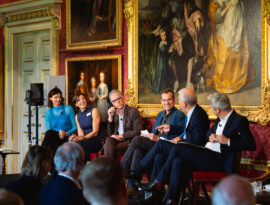Summit Synopsis
The Goodwood Health Summit 2024: 'The Microbiome, Infant Feeding & the First Five Years'
The second annual Goodwood Health Summit presented by Randox Health took place at Goodwood House on Thursday September 19. This year’s event focussed on ‘The Microbiome, Infant Feeding & the First Five Years’. Her Grace the Duchess of Richmond, a long-standing and prominent health campaigner invited six world-leading experts to address the Summit in a series of sessions moderated by broadcaster, journalist and psychologist Sian Williams.
Opening the Summit and welcoming the guests, Her Grace told them that as they listened and spoke to each other, they created an opportunity for change. Summit co-founder Stephanie Moore, the clinical nutritional therapist, author, and co-founder and lead for the Goodwood Gut Health Programme encouraged delegates to collaborate, and to share ideas and ideals. “These conversations create a ripple effect,” she said. ‘Healthy babies become healthy adults, who in turn make healthy babies.”
Session 1:
Understanding the infant microbiome and the role of good nutrition in child development
Dr Vicky Sibson, Public Health Nutritionist and Director of First Steps Nutrition, the independent public health nutrition charity supporting eating well from pre-conception to five years
Dr James Kinross, world-leading authority on the human microbiome; author of Dark Matter, the leading work on the subject; and a gastroenterologist at Imperial College London
James Kinross describes himself as a surgeon operating mainly on bowel cancer, who has become bored of it because it’s mostly preventable. The rise in non-communicable diseases is driven by loss of diversity in the human microbiome, he believes. Biodiversity is a measure of the health of any ecosystem, and our internal ecosystems are losing it at an alarming rate – an estimated 40 per cent since the start of the Industrial Revolution – meaning we are suffering both internal and external climate crises.
Unless we understand the early development of the gut we can’t understand later chronic disease, he told the Summit, and the health of the maternal microbiome is a profoundly important determinant of infant health. He described the variety and complexity of that microbial inheritance as being ‘like a symphony’: but the nature of the song is changing. The microbiome explains why breastfeeding is so powerful, he said: it illuminates the mechanism of what we have always known to be true. For Kinross the microbiome is the ‘missing link’ in the breastfeeding story: and breast milk is ‘the ultimate personal nutritional strategy’ and a ‘very, very’ powerful determinant of the health of the microbiome. Infants who are formula-fed have profoundly different gut health and very different set of bacteria, he said. Breastfeeding is a ‘founding event’ in the development of the gut: it is very hard to change the microbiome after weaning, and by the age of 3 to 5 we have the microbial basis of our adult gut. The greatest gift of the microbiome is in its ability to prevent disease, and a health microbiome is ‘a fundamental human right.’
Dr Vicky Sibson agreed that the new understanding of the microbiome shines a light on early years development and its significance in prevent later ill-health. Understanding these issues at the micro – or microbial – level helps at the macro level too, when talking to legislators, educators and directly to families. Public policy should be reformed to enable women to achieve breastfeeding goals, she said, but significant social and economic barriers to breastfeeding would still remain, such as mothers returning to work earlier than they want to. More than two-thirds of mothers start breastfeeding, but by eight weeks the majority of babies in the UK are exclusively formula-fed. It’s important to normalise breastfeeding exclusively to six months, and to the age of two or beyond, she said, if mothers can.
But this debate must not be about stigmatising families who use formula, Dr Sibson insisted: it is about the behaviour of some of the companies which produce it. She castigated the ‘insidious’ marketing of formula, and gave the Summit the memorable description of most infant food as being either ‘smooth mush or melty nothingness’. Infant foods have the look and feel of healthy foods but in many cases are really just snacks, and habituate children to snacking. We get more nutritional information from food companies than from healthcare professionals, she said, and the marketing of formula undermines women’s confidence when breastfeeding. It is within the power of politicians to fix that, and one specific solution would be to adopt the World Health Organisation’s Code of Marketing of Breast-Milk Substitutes as UK law.
Dr Sibson believes that there is a good level of public understanding around healthy eating, but with high levels of food insecurity generally and the highest levels among those with children under four it is hard for families to make better choices. Good food can be twice the price of bad food per calorie, and often less accessible. More generally, the healthcare community often ‘works in silos’, she said, and needs to come together on these issues.
Responding to questions from the floor, James Kinross expanded on the risks to the microbiome from the over-prescription of antibiotics, and their presence in the food chain. Our gut health can sustain an antibiotic hit once, he said, but not hit after hit in conjunction with a poor diet high in ultra-processed foods. He observed that the change required on all these subjects can seem overwhelming at times, but we know what we need to do, and we can do it. He noted that after 20 years of speaking about the human microbiome to empty lecture halls, events like the Goodwood Health Summit prove that things are starting to change.
Session 2:
The challenges facing new parents in understanding pregnancy and birth decisions, and the question of UPFs in baby food
Professor Louise Kenny, Executive Pro Vice Chancellor of the Faculty of Health and Life Sciences at the University of Liverpool, leader of the ground-breaking C-GULL birth cohort study and a former Professor of Obstetrics and Gynaecology
Dr Chris van Tulleken, the BAFTA-winning broadcaster, a doctor at the Hospital for Tropical Diseases in London and an Associate Professor at UCL, where his research focuses on how corporations affect human health
Professor Louise Kenny opened the session by telling delegates that the UK has led the world in birth cohort research since after the Second World War, but that there have been no studies done in the digital age or post-pandemic, or with our current understanding of the human microbiome. Nor have they looked at mental health or the role of both birth parents. Her ground-breaking C-GULL birth cohort study in Liverpool, following the outcomes of 10,000 babies born in the city, aims to address all of these points.
The influential Barker hypothesis on the importance of the first thousand days of life may also be explained by a better understanding of the microbiome and its link to conditions such as cardiac disease and diabetes, she said. Our health outcomes may largely be defined in those first thousand days, and after that any intervention may just be ‘nudging the dial’. Further, we need to talk about women’s health before conception. Mothers who are clinically obese suffer a higher risk of gestational diabetes, intervention during birth, and babies with very low or high birth weights. Liverpool is a city of marked socio-economic inequality, Professor Kenny said. Just four stops on Merseyrail can see women live 12 years less, and she had returned to Liverpool after 20 years to find a situation in the north of the city as bad or worse than it was when she left. She had ‘seen stuff that belongs in a Dickens novel’, and that lifting mothers and children out of poverty would be the biggest public health intervention we could make.
Everyone interacts with pregnancy even if it’s only once in their life, she said. It is not just a women’s health issue and not just limited to the period of pregnancy, yet a medical establishment led by white, middle class and middle-aged men systemically undervalues the health of children and mothers.
Dr Chris van Tulleken agreed with Professor Kenny on the importance of the first thousand days of life. Investing £1 in better health in that time yields a bigger return than at any other stage of life, but we spend most of our health budgets at the other end of life. He was a ‘formula baby’, he said: one of twins born to a mother who went back to work early. The conversation around the benefits of breastfeeding is traumatic for his mother and others like her, he said, and we need to conduct it in a kind way. He was aware that he had choices, and those he spoke to may not.
Professor Kenny concurred, saying that previous birth cohort studies had left us with a view that health issues in early years were the mothers’ fault, and left mothers feeling guilty. Mothers can carry enormous guilt, she said, making it difficult to have a compassionate conversation around these issues. And even as an expert, breastfeeding is tough, she said. “I have a medical degree, a PhD and have run the London Marathon and breastfeeding is still the hardest thing that I’ve done.” As a society we still don’t make breastfeeding easy or normalise it, she added, and that’s a tragedy.
Dr van Tulleken said the UK remains a ‘formula culture’ and that the marketing of formula and other children’s food is incredibly powerful and persuasive even if, like him, you’re a physician with an interest in child nutrition. There is an ‘oligopoly’ of formula producers, he said, with more than half being produced by just four companies, and bought from a limited number of supermarkets. He had been offered ‘life-changing’ sums of money to speak to the industrial food manufacturers, and while it was important to engage with them, we should not take their money. Academic research is biased by being funded by the companies but there is so little money for it from other independent sources that he understands why researchers go to them. The WHO Code of Marketing of Breast-Milk Substitutes is a ‘massively important document regulating a harmful product and an industrial sector’, he said, and he echoed the debate in the first session, saying that the single biggest thing we could do would be to adopt the code as UK law. The big ultra-processed food makers are not improving, he said: they all claim to be ‘on a journey’, but they’ve been on it since the 1970s and it seems to be never-ending.
Again, Professor Kenny agreed, saying that as a consultant in obstetrics and gynaecology, the formula brands would fight to get into her maternity wards and give free samples to new mothers, attempting to start a habit and a brand loyalty among mothers which she had seen extend over three generations.
But she said that schemes such as Sure Start show that public health initiatives really can work, and that there are things we can do at a population and a policy level to effect change. Politicians have to look beyond five-year election cycles, she said: it could be 15 or 50 years before we see the benefit of investment in early-years development.
From the floor, Jess Brown-Fuller, the newly elected Liberal Democrat MP for Chichester said there is now a political will to correct the historic undervaluing of such investment, particularly now that 44 per cent of parliamentarians are women, and she pledged to work to re-establish the All-Party Parliamentary Group on infant feeding and inequality. Van Tulleken agreed, saying such investment was not a charitable decision but an economic one. There is lots of cause for optimism, he said, but we need to think in revolutionary terms.
Session 3:
Q&A from delegates and the online audience
The four panellists, plus:
Gabrielle Palmer, author of the seminal book The Politics of Breastfeeding, never out of print since it was first published in 1988 and now in its third edition
Stephanie Moore, clinical nutritional therapist, author, co-founder of the Summit with Her Grace the Duchess of Richmond , and co-founder and lead for the Goodwood Gut Health Programme
In response to a question on supplements, Stephanie Moore said that she regarded them as a ‘topper-upper’: supplements have their place, she said, but shouldn’t be the main focus. She took a food-first approach, and believes we can get a thriving microbiome from food alone.
Answering an online question on breastfeeding support schemes, Professor Kenny said that breast milk was one of the most ‘complex and miraculous’ substances on the planet, and one of the most understudied and least understood. A breastfeeding mother can sense what her infant needs, and produce and release the appropriate immunoglobulins in breast milk. She said that support is the major contributing factor to continuing breastfeeding, but it is costly and we are in cost-constrained times. Financially it makes sense, but that message isn’t coming through to those who make decisions.
In response to a question on the role of artificial intelligence in understanding the human microbiome, she said that AI will be transformational across medicine as an aid to analysis, but that we should not analyse the microbiome in isolation, otherwise we will end up in a silo. Many other factors such as the environment and genetics have a part to play. We once thought that the human genome would explain everything, she added, but it didn’t quite deliver the step-change in understanding that we anticipated. Stephanie agreed, adding that there was still no definition of the ideal microbiome, and that any such definition was still a long way off.
Answering a question on school meals, Vicky said there is a crisis in sustainability of school food. The budget per meal has remained almost the same in absolute terms over the past 10 years, and that contract caterers cut both corners and nutrition.
Dr Chris Van Tulleken said that all countries are undergoing nutritional change, and that every country that moves from traditional nutrition to industrialised food sees problems. Countries may think that they have a strong food culture, but industrialised food is on a mission to destroy that, and the only real way to resist is to regulate. A total investment of perhaps $500m in counter marketing – a fraction of what the transnational industrialised food makers spend – would be sufficient when evidence is on your side.
Reflecting on her long and hugely influential career, Gabrielle said she had seen examples of bad foods being removed from the market, and that she believes that formula should be treated like a drug or a replacement body fluid, with side effects and health warnings printed on the packaging like cigarettes. She had thought that things had got worse since she retired, but that she was ‘very cheered up’ by the discussion at the Summit. There was hope, she said.






